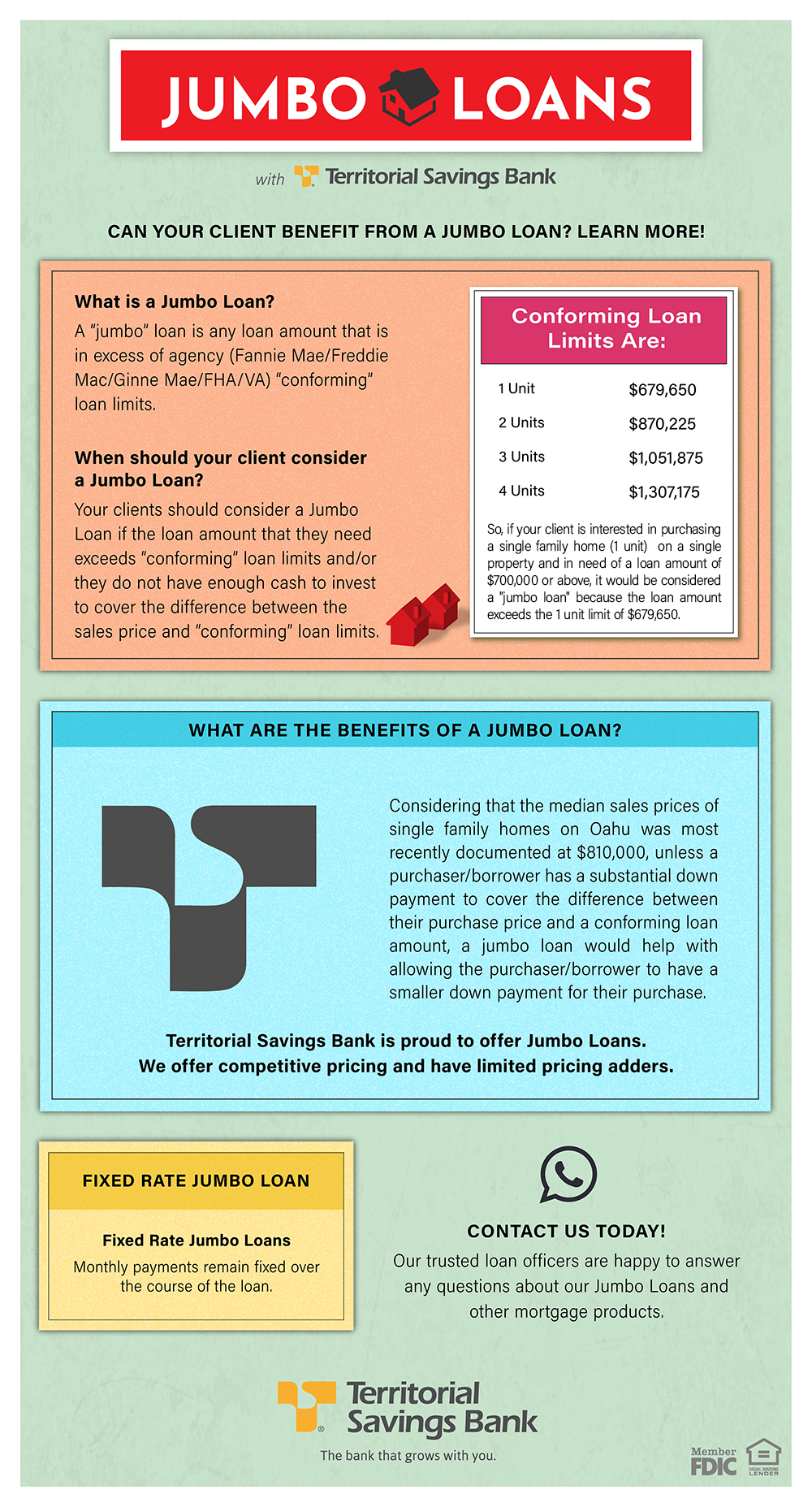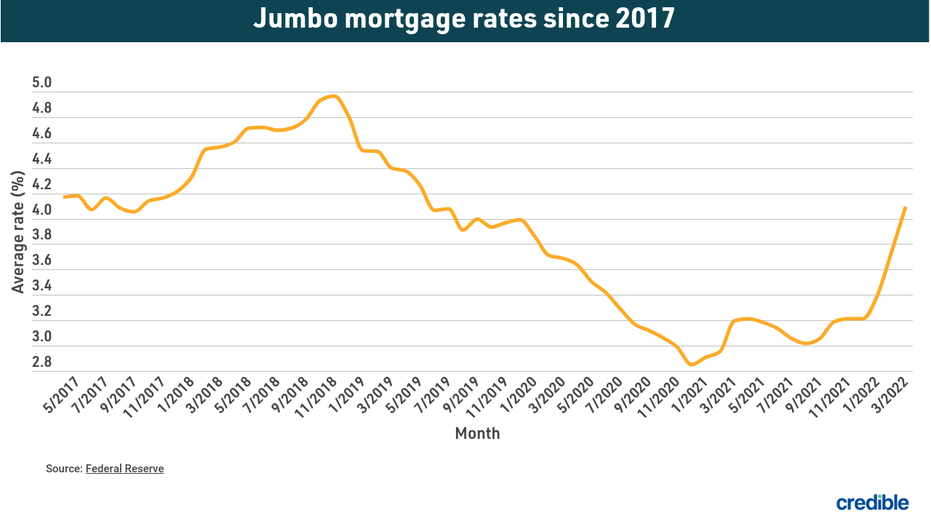Jumbo Loan: Affordable Rates and Flexible Terms for Pricey Properties
Jumbo Loan: Affordable Rates and Flexible Terms for Pricey Properties
Blog Article
Browsing the Jumbo Lending Landscape: Vital Insights for First-Time Homebuyers
Navigating the intricacies of jumbo fundings offers an one-of-a-kind collection of challenges for new buyers, particularly in an advancing realty market. Recognizing the vital eligibility requirements and potential benefits, together with the drawbacks, is essential for making informed choices. In addition, developing a solid economic approach can substantially improve your potential customers. Involving with professionals in the area can brighten pathways that might originally seem intimidating. As you explore these details, it comes to be clear that a much deeper understanding can reveal opportunities that might otherwise be ignored. How can you finest position yourself for success in this specialized sector of loaning?
Comprehending Jumbo Lendings

Due to the fact that jumbo lendings are not backed by government-sponsored entities, they lug different underwriting criteria and need more thorough financial documents. This difference can result in higher interest rates contrasted to traditional lendings, provided the enhanced risk to loan providers. Nonetheless, jumbo finances also offer one-of-a-kind benefits, such as the ability to fund higher-value homes and potentially more adaptable terms.
Newbie homebuyers must additionally know that protecting a big financing frequently necessitates a bigger deposit, commonly varying from 10% to 20%. Furthermore, debtors are generally anticipated to show solid creditworthiness and a secure income to certify. When discovering jumbo funding choices in their pursuit of homeownership., recognizing these nuances can equip newbie property buyers to make informed decisions.
Eligibility Demands
Securing a big financing calls for meeting particular qualification requirements that differ considerably from those of conventional fundings. Unlike conventional lendings, which are often backed by government-sponsored entities, jumbo loans are not guaranteed or guaranteed, resulting in stricter requirements.
One main demand is a greater credit rating. Lenders generally anticipate a minimum score of 700, although some may enable reduced scores under specific problems (jumbo loan). In addition, debtors need to show a durable economic account, that includes a reduced debt-to-income (DTI) ratio, generally no greater than 43%. This makes sure that consumers can manage their monthly repayments along with other financial obligations.
In addition, a lot of loan providers need substantial documentation, consisting of proof of income, possession statements, and tax returns for the past two years. A substantial down payment is also important; while traditional finances may allow down repayments as reduced as 3%, jumbo finances often necessitate a minimum of 20%, depending upon the financing and the lender amount.

Benefits of Jumbo Fundings
For numerous newbie buyers, jumbo finances offer distinctive advantages that can facilitate the journey toward homeownership. One of the main advantages is the capability to fund residential properties that exceed the adapting funding limits set by government-sponsored entities. This adaptability allows customers to access a bigger variety of high-value residential or commercial properties in competitive realty markets.
Additionally, big finances often include eye-catching interest prices that can be less than those of traditional financings, especially for consumers with solid credit profiles. This can lead to substantial savings over the life of the funding, making homeownership more affordable. In addition, big fundings typically enable for greater car loan quantities without the requirement for exclusive home mortgage insurance coverage (PMI), which can better reduce total expenses and regular monthly payments.

Potential Drawbacks
Numerous prospective property buyers might find that big car loans come with substantial disadvantages that warrant careful consideration. One of the primary concerns is the stringent credentials requirements. Unlike adjusting finances, big finances commonly call for greater credit score ratings, usually exceeding 700, and significant income documentation, making them less accessible for some customers.
Furthermore, big finances typically come with greater interest prices contrasted to conventional car loans, which can lead to boosted monthly repayments and general borrowing prices. This premium may be specifically burdensome for novice property buyers who are currently navigating the financial complexities of buying a home.
An additional noteworthy disadvantage is the bigger deposit requirement. Several lenders expect a minimum down payment of 20% or more, which can present a challenge for customers with limited savings. The absence of government support for big loans leads to less favorable terms and problems, enhancing the risk for lenders and, subsequently, the borrowing expenses for homeowners.
Last but not least, market changes can considerably impact the resale value of high-end buildings funded with jumbo finances, adding an element of economic unpredictability that newbie homebuyers might discover complicated.
Tips for First-Time Homebuyers
Browsing the intricacies of the homebuying procedure can be frustrating for new buyers, especially when considering big loans (jumbo loan). To simplify this trip, adhering to some essential techniques can make a considerable distinction
First, inform yourself on jumbo fundings and their specific requirements. Understand the helpful hints various loaning requirements, including credit score ratings, debt-to-income ratios, and down repayment expectations. Commonly, a minimum credit rating of 700 and a deposit of a minimum of 20% are crucial for approval.
2nd, involve with a knowledgeable home loan specialist. They can offer insights tailored to your financial circumstance and aid you navigate the intricacies of the big finance landscape.
Third, consider pre-approval to strengthen your purchasing setting. A pre-approval letter signals to vendors that you are a major customer, which can be beneficial in competitive markets.
Finally, do not overlook the relevance of budgeting. Aspect in all costs connected with homeownership, consisting of residential property taxes, upkeep, and home owners' insurance coverage. By following these pointers, first-time purchasers can come close to the big loan procedure with greater self-confidence and clearness, improving their opportunities of successful homeownership.
Conclusion
To conclude, browsing the big finance landscape requires a comprehensive understanding of eligibility criteria, benefits, and prospective disadvantages. First-time buyers can improve their chances of success by maintaining a solid credit history, handling their debt-to-income proportion, and preparing for bigger down repayments. Involving with well-informed home mortgage professionals and acquiring pre-approval can additionally reinforce settings in open markets. Eventually, detailed prep work and education and learning pertaining to big fundings can bring about even more educated decision-making in the homebuying procedure.
When navigating the intricacies of the housing market, comprehending jumbo car loans is essential for first-time property buyers aiming for homes that go beyond conventional finance limits. Jumbo finances are non-conforming finances that usually go beyond the adapting loan restriction established by the Federal Real Estate Money Agency (FHFA)Furthermore, big financings usually come with attractive interest prices that can be reduced than those of conventional loans, particularly for consumers with strong credit report accounts. Jumbo fundings typically allow for higher car loan amounts without the why not find out more demand for private home mortgage insurance policy (PMI), which can additionally minimize general costs and month-to-month repayments.
Unlike conforming fundings, big financings normally call for higher debt dig this ratings, often surpassing 700, and considerable earnings documents, making them less easily accessible for some consumers.
Report this page